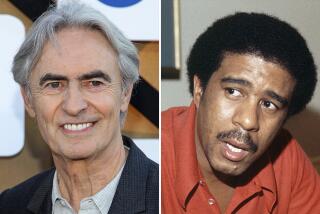More Bleepin’ Profanity Is Creeping Into Airwaves
- Share via
In the bestselling new novel “Turn of the Century” by Kurt Anderson, one of the hit shows on a pretend network, MBC, is called “Freaky S---!” The real name is a vulgarity for excrement, and much sport is made over station employees’ sense of adventure for using a curse word in the title of a show.
One of the book’s subplots--about cats’ brains and computers--seems futuristic and unreal, but the general attitude toward vulgarities in the media seems entirely plausible.
There was a live radio feed of last weekend’s Woodstock ‘99, and certain rock stars took advantage of the national audience and cursed freely. Fox network has a new, bleep-laden sitcom called “Action” coming in the fall.
“If you’re going to be offended,” Fox entertainment President Doug Herzog told reporters recently, “please don’t watch. Watch somebody else’s network for that half-hour. We’d rather not field the phone calls and the e-mail and letters.”
In 1972, George Carlin was arrested for his comedy routine “Seven Words You Can’t Say on TV.” While newspapers still can’t comfortably print most of those seven words, would such a routine be allowed on television today?
Can you say “South Park”? Social mores are forever changing, but in the realm of curse words, is there anyone left to offend?
The argument over whether the media are leading the way or only reflecting society’s evolution is waged continually in the academic press. Robert Thompson, professor of TV-radio-film and director of Syracuse University’s Center for the Study of Popular Television, said, “As in almost every other case, the media are from five to 10 years behind the actual American cultural market.
“In the case of profanity, mothers now use it with their kids in grocery stores; teachers use it as well as their students. It was inevitable that television would eventually learn to swear.”
Those who don’t yet swear are Family Safe Media’s market. The Oregon company sells a variety of technological blocks affecting entertainment some might deem inappropriate. Their products include V-chips and something called the TVGuardian, which filters profanities from videos and television as they’re being viewed. A company spokesman, Terry Hale, said the device is popular among parents who don’t want to be restricted in their programs but want filters on profanity. The machine reads closed-caption signals and mutes the sound at a swear word or phrase. Because words around the offensive ones are also muted, one of the machine’s options allows an edited version of the phrase to run across the bottom of the screen, in a caption.
National radio network Westwood One’s Woodstock feed employed a delay, said a Westwood One representative. The delay allowed a station to edit--somewhat--the content it used on-air, but even the eight-second delay used at some stations was not enough for employees to catch every obscenity. However, David Hill, program director at Connecticut’s WMRQ, said the station received two calls from listeners who objected to the obscenities. Considering the amount of profanity, that’s a fairly small sampling, but then the festival itself, according to reports, was far wilder than the original 30 years ago.
Concert promoter John Scher, in tacit agreement with Thompson’s assertion that the media is only a mirror of change, said, “There were no mosh pits in 1969.”
Besides families who just don’t allow cursing, there are still plenty of public places in which profanity is still unwelcome. Try cursing in front of a judge, and one of Jack Carragher’s special deputy sheriffs will show you the door.
“I can tell you what happens. It’s very simple. Those people are in contempt of court, and if it’s serious enough, they will be arrested, and they will be returned to court and arraigned. That’s the way it works,” said Carragher, chief supervisor of uniformed personnel for the Hartford, Conn., County court system.
Keeping language clean--and shirts tucked in and a respectful attitude toward the officers of the court, is part of “the decorum of the courtroom,” Carragher said. At Albert D. Griswold Middle School in Rocky Hill, Conn., assistant principal Cori-Ann Marino uses positive reinforcement to keep the language clean.
“We have a list of expectations,” Marino said. “We may start it with, ‘Students are expected to behave responsibly,’ and the first part of that is, ‘Respect all peers and adults.’ Obviously, you wouldn’t use profanity if you’re being respectful.”
More to Read
Sign up for our Book Club newsletter
Get the latest news, events and more from the Los Angeles Times Book Club, and help us get L.A. reading and talking.
You may occasionally receive promotional content from the Los Angeles Times.










